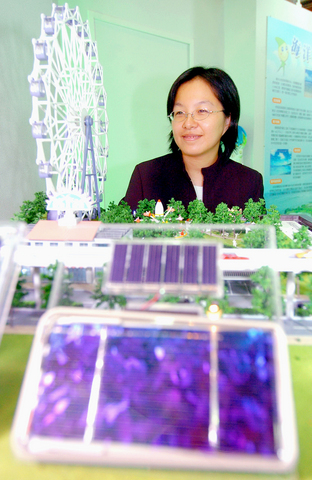Taiwan should make a comprehensive energy policy and implement measures to cut greenhouse emissions to comply with the Kyoto Protocol that took effect on Feb. 16 this year, officials and energy experts said yesterday.
"The energy and climate policies made in 1998 did not help reduce emissions of carbon dioxide, or greenhouse emissions, meaning the policies need to be overhauled," Lee Chien-ming (李堅明), associate professor at National Taipei University's Institute of Natural Resource Management, said at the National Energy Conference in Taipei yesterday.
The two-day conference is being held to examine and modify Taiwan's energy policies in different sectors to reduce greenhouse gas emissions after the Kyoto Protocol went into effect.

PHOTO: LIAO CHENG-HUI, TAIPEI TIMES
Under the protocol, industrialized countries agreed to reduce emissions by an average 5.2 percent from 1990 levels by 2012.
Though not a signatory of the global agreement because it is not a member of the UN, Taiwan has pledged to keep in line with the international trend toward environmental protection since 1998, one year after the Kyoto Protocol was proposed.
In that same year, the government held a national energy meeting and came up with policies to keep carbon dioxide emissions at the 2000 level by 2020, and enhance efficiency in energy productivity by 28 percent.
Those efforts, however, did not achieve the goals, as energy consumption rose by 28 percent from 1998 to 2003, and carbon dioxide emissions also increased 26 percent to 255.98 million tonnes in 2003, Lee said, citing statistics from the Bureau of Energy under the Ministry of Economic Affairs.
Ho Shun-chin (
She said Taiwan relies heavily on fossil-fuel energy, which accounts for about 90.6 percent of all energy supplies. Coal, which produces the most carbon dioxide, increased from 17.5 percent of consumed fossil fuels in 1983, to 32.5 percent in 2003 -- a more rapid increase than other fuels, such as oil and natural gas, she added.
To deal with the situation, both Lee and Ho urged the government to initiate a bill to regulate greenhouse gas emissions and set out effective measures and tools to carry out the policies.
One suggestion is to adjust electricity prices to reflect fluctuating energy prices, Ho said.
"Industrial users, in particular, consume the majority of electricity, but pay one-third to one-half of the fees that household users pay," she said.
Another measure is adding a fuel surcharge to retail gasoline prices, in a bid to discourage usage of gasoline while helping cut emissions from autos and motorcycles, Lee said, adding that this policy was first proposed during the 1998 meeting, but was not implemented.
Development and promotion of renewable energy is another solution, said Arnold Baker, president of International Association for Energy Economics.
Baker addressed at the conference yesterday as a guest speaker. He said that hydrogen, for example, has been widely used by governments and car companies as a major renewable energy source and atlernative to solar, wind and geothermal energy.
In addition, nanotechnology has the potential to fundamentally change energy supply and demand, as several innovations from applications of the technology have been shown to improve power efficiency, he added.
Admitting that the government has a lot of work to do, Vice Premier Wu Rong-i (吳榮義) said energy policies should be made in such a way as to decouple economic growth and environmental contamination, as many advanced countries already maintain high GDP growth rates without producing more emissions.
The energy conference will continue today at the Taipei International Convention Center. The focus will be on possible impacts the protocol will have on various sectors and related responses.

South Korea’s equity benchmark yesterday crossed a new milestone just a month after surpassing the once-unthinkable 5,000 mark as surging global memory demand powers the country’s biggest chipmakers. The KOSPI advanced as much as 2.6 percent to a record 6,123, with Samsung Electronics Co and SK Hynix Inc each gaining more than 2 percent. With the benchmark now up 45 percent this year, South Korea’s stock market capitalization has also moved past France’s, following last month’s overtaking of Germany’s. Long overlooked by foreign funds, despite being undervalued, South Korean stocks have now emerged as clear winners in the global market. The so-called “artificial intelligence

CONFUSION: Taiwan, Japan and other big exporters are cautiously monitoring the situation, while analysts said more Trump responses ate likely after his loss in court US trading partners in Asia started weighing fresh uncertainties yesterday after President Donald Trump vowed to impose a new tariff on imports, hours after the Supreme Court struck down many of the sweeping levies he used to launch a global trade war. The court’s ruling invalidated a number of tariffs that the Trump administration had imposed on Asian export powerhouses from China and South Korea to Japan and Taiwan, the world’s largest chip maker and a key player in tech supply chains. Within hours, Trump said he would impose a new 10 percent duty on US imports from all countries starting on

Chinese artificial intelligence (AI) start-up DeepSeek’s (深度求索) latest AI model, set to be released as soon as next week, was trained on Nvidia Corp’s most advanced AI chip, the Blackwell, a senior official of US President Donald Trump’s administration said on Monday, in what could represent a violation of US export controls. The US believes DeepSeek will remove the technical indicators that might reveal its use of American AI chips, the official said, adding that the Blackwells are likely clustered at its data center in Inner Mongolia, an autonomous region of China. The person declined to say how the US government received

Like many of us who are mindful of our plastic consumption, Beth Gardiner would take her own bags to the supermarket and be annoyed whenever she forgot to do so. Out without her refillable bottle, she would avoid buying bottled water. “Here I am, in my own little life, worrying about that and trying to use less plastic,” she says. Then she read an article in this newspaper, just over eight years ago, and discovered that fossil fuel companies had plowed more than US$180 billion into plastic plants in the US since 2010. “It was a kick in the teeth,” Gardiner